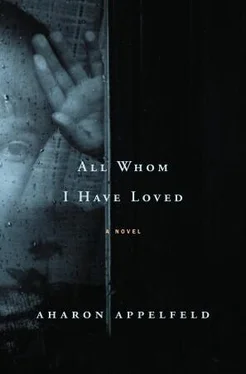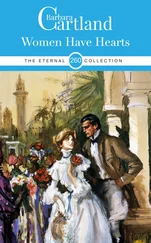Mother stuffs utensils and clothes into the suitcases. The two suitcases are already full, and yet still she crams more into them. Her movements are full of force and bring to mind a destructive anger.
Later, a driver comes and loads the suitcases onto a wagon, then we climb up as well. It's the first time that I've ridden in a simple open wagon in the city. I feel as though everyone is looking at me. Mother, too, seems embarrassed, for she wears a broad-brimmed hat and sunglasses.
At the station, porters help us, taking the suitcases and the bags to the train. The porters are so tall and so broad that they seem like a different breed of people. Mother pays them, but they demand more, and Mother gives in to them without bargaining.
We sit in the second-class car and Mother's face is restored to her. She tells me that in the garden city we will have a large house with a porch and a garden. When Mother is comfortable she likes to describe things, and I can picture them vividly. Sometimes the place or the person doesn't bear any resemblance to what she has described, perhaps because when she gets enthusiastic she exaggerates. I love her exag-gerations — they suit her.
The journey passes quietly. Though there are some drunks in the car, there are no fights. We eat sandwiches and drink lemonade, and we gaze at the passing landscape. At one of the stations we get off and Mother buys me an icecream cone. It is pink and tasty and reminds me of another ice cream that I ate with Father in a remote place next to an old chapel.
Then I fall asleep, and in my sleep I see black peddlers like the ones I saw at the riverbank. They are huddled together next to a tall tree. When they discover me, they turn toward me and ask how Father is. I freeze in fear. I want to run away but my legs are tied.
I awake in fright and confusion. Mother kisses my forehead and rubs my shoulders to take away my bad dream. Whenever I have bad dreams, Mother says, “Every sleep has bad dreams. It's only a deception.” But what's to be done? The dreams awaken me even when they disappear. Sometimes they cling to me the entire day, returning at night, and sometimes I have a bad dream that goes on for an entire week.
While the train hurtles on, a man approaches Mother and addresses her by name. It turns out that he is an old acquaintance. He and Mother studied together at the teachers' seminary, and they haven't seen each other for years. He immediately joins us and they become immersed in a lighthearted conversation. Mother knows how to make people happy, but her openness actually makes me sad. When she tells stories and gets enthusiastic she forgets me, and I feel neglected. Once, she met a friend from the orphanage, and she was so happy that she left me on a bench in the park. “Mother!” I shouted, but she didn't hear me. People gathered around me, asked my name, and offered me candies. I was in despair, and I shouted, “Mother! Mother!” Eventually she came back and collected me.
Now the strange man sits and chats with Mother; they laugh and recall lighthearted memories. I stare at the man's face and I can't find a single pleasing feature in it. He's shorter than Mother, bald, and he wears glasses. Apparently Mother doesn't see the defects that I see; she listens to him and they recall names and places that sound strange and unpleasant to me. It's hard for me to take this lightheartedness, and I want to shout, “Stop this chattering, it hurts me!” But of course I hold it in and don't say a word.
Eventually, I feel sick and I throw up. Mother hastens to my side and holds my forehead.
The train has stopped. We get off, and Mother rinses out my mouth with water. The stranger parts from Mother, wishing her good luck in her new position. The train goes on its way, and I'm glad that there is no longer anyone between me and my mother. I cry, and Mother, who does not understand my tears, says, “What's come over you? Does something hurt you?”
She doesn't know that I am crying from sheer happiness.
This time Mother has not exaggerated. The new house is large, and behind it a garden stretches all the way to the forest. “I told you,” Mother says, and there is a mischievous sparkle in her eyes. She will soon begin teaching, but in the meantime there is plenty of time for us to go on walks and outings. Although a small town, Storozynetz does have some splendid stores and a café. Behind the houses and the stores, the fields and the orchards go on and on, and the farther we get from the town, the more I feel my life expanding. It is good to be near Mother.
“Mother,” I say, and she holds my hand tightly.
In the afternoon we sit on the mat behind the house. The landlord comes by to ask if everything is all right and if we need anything. He's short and he speaks German with a heavy accent, but he has a kind face and it seems that we won't have any differences of opinion, as we did with the landlord in Czernowitz.
In the evening Mother lights the large oil lamp and the dusky kitchen fills with light. We eat only vegetables, fruit, and dairy products and do not touch meat. One mustn't kill animals, Mother once said. I'm afraid to look the cows in the pasture in the eye. They seem to know what their fate is and are asking me to save them.
Dinner lasts about an hour. In Czernowitz, Mother gave private lessons, with students arriving one after another and filling our small apartment with unquiet. At night, Mother would complain of headaches and would lie in bed with a damp cloth on her forehead. Now she doesn't complain. Her headaches seem to have stopped.
After dinner we sit in the bedroom, and Mother reads me Alice's Adventures in Wonderland. I'm so excited that Mother is near me that I find it hard to fall asleep. Even when I'm in bed, we go on talking. Mother reminisces about our vacation in the country, and suddenly all the images I stored up come to life. The river there wasn't deep or swiftly flowing, and perhaps this is why I remember it so well. I'm afraid that these clear images will be erased from my memory, and I repeat to myself: they won't be wiped away, they won't disappear, they will always be with me just as Mother will always be with me. But this very repetition stirs in me a deep sorrow that insinuates itself within me and resurfaces the next evening at twilight, when we come back from the street and stand in front of the house.
“Mother,” I say.
“What is it, my love?”
“Will we return to that village?”
“Why are you asking, my love?”
“I'm afraid that the village will disappear.”
“It won't disappear,” Mother says, and opens the door.
Even as our days are rich and overflowing, I discover that next door to us is a low structure, quite simple, surrounded by a fence, its yard full of bearded men.
“Who are they?”
“Jews.”
“What are they doing here?”
“They've come to pray.”
The bearded Jews frighten me, and when I stare at them from up close, they seem to be hiding something. Their movements are hasty and they're talking in whispers. I tell Mother what I'm thinking and she laughs, saying, “They're just like anyone else.”
Their prayer is also strange, a mixture of calls and shouts.
“That's the way they pray,” Mother says.
“Why are they shouting?”
“So that God will hear them.”
Meanwhile, we spend most of the day outside. We eat lunch in a restaurant, dressed in warm clothes. Sometimes it seems to me that we're only on vacation here, and that we'll soon return to Czernowitz. Sometimes, a man who looks exactly like my father passes us. I let go of Mother's hand and run toward him, but I realize immediately that I am mistaken. And when the evening is clear and there's no rain, we walk all the way down the main street and then on toward the fields. The fields are flat and open, and even if we walked the entire night, we would not reach the horizon.
Читать дальше












